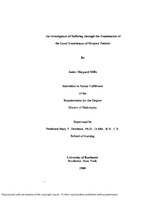An investigation of suffering through the examination of the lived experiences of hospice patients
View File(s)
Visitor Statistics
Visits vs Downloads
Visitors - World Map
Top Visiting Countries
| Country | Visits |
|---|
Top Visiting Cities
| City | Visits |
|---|
Visits (last 6 months)
Downloads (last 6 months)
Popular Works for Mills, Junko M. by View
| Title | Page Views |
|---|
Popular Works for Mills, Junko M. by Download
| Title | Downloads |
|---|
View Citations
Citations
Although there is a historical and philosophical link between nursing and the suffering of people, a review of literature revealed that there are only a limited number of articles treating suffering conceptually or analytically, and the experience of suffering is under-analyzed. Further, a review of literature also revealed that the lived experiences of hospice patients, which were identified to be an appropriate place to begin an investigation of suffering, have not been well investigated. Accordingly, the two aims of this study were to describe the lived experiences of hospice patients, and to understand what their experiences can inform us about the concept of suffering. Seven hospice patients were interviewed between 2 and 12 times, with each interview lasting between 30 minutes and 2 hours. In each interview, the participants were asked to talk about whatever they wished. The conversations were tape-recorded, transcribed, and interpreted through a hermeneutic phenomenological analysis based on the existential philosophy of Martin Heidegger and the phenomenological approach described by van Marten. Through interpretation, five themes were identified in the lived experiences of the participants. First, the participants experienced a clear starting point of their illness experiences. Second, the participants experienced the deterioration of their body. Third, the participants experienced isolation, spatially-physically and relationally-socially. In addition, the participants also experienced existential-experiential isolation. Fourth, the participants experienced uncertainty in their everyday lives. And fifth, despite their physical deterioration, the participants experienced their existence as a Being with possibilities, rather than a Being with no future possibilities. The participants also identified several helpful and aggravating things in their everyday living. Based on the findings of this study, suffering was defined as a threat to the Understanding of Being, and the attributes of suffering found in the literature were reexamined. Also, this study revealed social, cultural, and institutional elements impacting hospice patients' lives. These were discussed in relation to the philosophy of Heidegger and Foucault. The strengths and limitations of the study, and the significant implications of the findings for further research, practice and education in nursing, were identified.
This dissertation has also been disseminated through the ProQuest Dissertations and Theses database. Dissertation/thesis number: 9967062; ProQuest document ID: 304622623. The author still retains copyright.
This item has not gone through this repository's peer-review process, but has been accepted by the indicated university or college in partial fulfillment of the requirements for the specified degree.
| Type | Dissertation |
| Acquisition | Proxy-submission |
| Review Type | None: Degree-based Submission |
| Format | Text-based Document |
| Evidence Level | Phenomenology |
| Research Approach | Qualitative Research |
| Keywords | Hospice Care; Patients at End of Life; Geriatric Nursing |
| CINAHL Subject(s) | Terminally Ill Patients; Life Experiences; Suffering; Terminally Ill Patients--Psychosocial Factors |
| Grantor | University of Rochester |
| Advisor | Dombeck, Mary T. |
| Level | PhD |
| Year | 2000 |
All rights reserved by the author(s) and/or publisher(s) listed in this item record unless relinquished in whole or part by a rights notation or a Creative Commons License present in this item record.
All permission requests should be directed accordingly and not to the Sigma Repository.
All submitting authors or publishers have affirmed that when using material in their work where they do not own copyright, they have obtained permission of the copyright holder prior to submission and the rights holder has been acknowledged as necessary.
Related items
Showing items related by title, author, creator and subjects.
-
Suffering had enough: Family caregivers' experiences of patients with terminal illness at the end-of-life
Shanmugasundaram, Sujatha (2013-10-22)Session presented on: Wednesday, July 24, 2013: Introduction: Many literatures proved that it is a great challenge for the family members caring for the terminally ill person at home. With an ageing population and increasing ... -
Providing hospice care for children: An organizational study
Lindley, Lisa C.Background. Of the 54,000 children, who die in the US, many lack access to hospice care. As terminally ill children increasingly return home to die, little is known about the hospices that provide care for children and ... -
Knowing about and caring for persons receiving hospice care: The lived experiences of nurses working in hospice agencies
Ferguson, Rita W. (2016-03-17)Session presented on Sunday, July 26, 2015: Purpose: Knowing and caring by hospice nurses has received minimum research. By illuminating hospice nurses' experiences, end-of-life quality of care may be improved and nursing ... -
Between this world and the next: The lived experience of having a life-threatening illness
Roop, Janna C.Wonderings about hospice patients' experience of dying evolved into the question, “What is it like to have a life-threatening illness?” That question guided this interpretive phenomenological inquiry. Phenomenology ... -
The lived experience of the hospice care nurse as primary provider of end-of-life care
Reinhart, EllenThis is the first qualitative research about the lived experience of the hospice care nurse as primary provider of end-of-life care in the United States. The hospice nurse plays a pivotal role in the growing hospice industry ...





